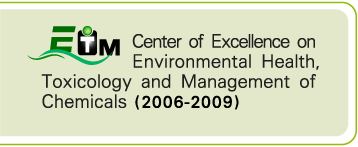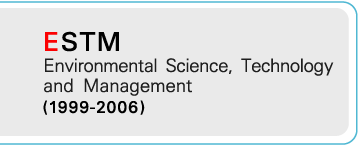|
This laboratory study was to identify the environmental toxicity of bioextract from municipal solid waste to be used as soil conditioner. The animal part bio-extract, vegetable bio-extract and the animal part mixed vegetable bioextract sample were prepared from the waste collected from the market in Bangkok. The acute toxicity of bioextract was determined by seed germination testing in five species of plant including of cucumber, tomato, lettuce, cabbage and green bean, whereas Pheretima peguana earthworm was used in sub-chronic toxicity testing to evaluate the impact on plant and animal in ecosystem. In addition, the related factors to acute toxicity of bioextract were determined in this study. The variation of bioextract characteristic was observable in this study. The average pH level of animal part, vegetable and animal part mixed vegetable was 4.56 4.14 and 3.89, respectively. There was not only pH level and conductivity in the vegetable type but the heavy metals concentration in all types of bioextract were still below the acceptable level for liquid fertilizer, particularly Pb, Zn, Cr and Cu. The observed lowest IC50 level in all kinds of plant indicates the highest toxicity of animal part bioextract to inhibit seed germination, whereas the lowest toxicity was found in vegetable bioextract. In addition, tomato was found to have lowest IC50 in all kinds of bioextract. For sub-chronic toxicity test of earthworm, it can conclude that animal part bioextract had highest toxicity with 6.30% of LC50. Determination of seed germination of tomatoes for the modified bioextract suggested that pH level should be an important factor to toxicity of organic and inorganic compounds in bioextract. แหล่งข้อมูล:
|
 Center of Excellence on Environmental Health and Toxicology (EHT)
Center of Excellence on Environmental Health and Toxicology (EHT)










